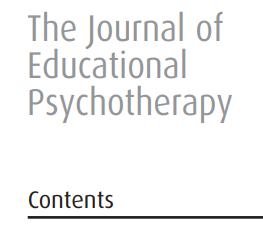The Caspari Journal of Educational Psychotherapy
The Journal of Educational Psychotherapy is an annual publication which aims to support and influence practice in educational and mental health settings. We publish articles concerning the role of feelings in education, and methods of helping pupils overcome emotional blocks to learning.
The journal is a valuable resource for teachers, prospective students, current trainees and established Educational Psychotherapists. Our back copies include articles recommended by course lecturers or supervisors and also offer valuable research material, covering many themes central to child mental health. Each edition includes reviews of books relevant to our work.
Issue 28, 2022
The 2022 edition of The Journal of Educational Psychotherapy begins with a tribute to a much loved and respected Caspari member, Gillian Salmon, who died earlier this year. Gill was one of the forerunners of Educational Psychotherapy and Lee Marsden and Jenny Dover bring together highlights of Gill’s life and work, as well as their own thoughts and memories.
The Primary Years, originally published in Educational Therapy and Therapeutic Teaching in 1998, is re-printed in honour of Gill’s extensive contribution to the development of Educational Psychotherapy.
Mary Sue Moore’s paper brings new insight into the ‘disorganised’ attachment classification, proposing that this pattern of attachment has been misunderstood; what she calls a ‘traumatic attachment relationship’ is, in fact, organised: ‘amygdala-organised’.
In Learning Begins Long Before Children Arrive at School, Ingrid Cleaver weaves the stalwart theories of Educational Psychotherapy with vivid examples from the therapy room to help us use our understanding of child development as a lens through which to ascertain where a child’s learning has become stuck.
Katy Singer explores the illuminating the power of a child’s own storytelling as a technique to help children gain resilience, emotional vocabulary and confidence in their ability to find meaning in the world; a wonderful affirmation of the impact of working in the metaphor.
In her topical research proposal, Ángela Palacios explores to what extent Educational Psychotherapists can help children who speak English as an additional language (EAL) to overcome a double obstacle: the impact of their trauma on their ability to learn and express themselves, and the language barrier which impedes their access to therapeutic interventions.
We finish with three book reviews. Lynsey Daniels is our cheerful guide through the second edition of Graham Music’s Affect and Emotion: A brief psychoanalytic tour, Rosie Chester reviews How It Feels To Be You by Tamsin Cottis, and Rosie Davies reviews Tavistock approaches in Psychoanalytic Psychotherapy in Primary Schools, edited by Katie Argent.
Featured extract
Traumatic (D) Attachment Relationships:
not disorganised but amygdala-organised
by Mary Sue Moore
In this paper, I will discuss the characteristics of the fourth attachment relationship (D) and
explain why I prefer to consider these parent-infant dyads as experiencing a traumatic
attachment relationship. I will clarify (a) what characteristics are uniquely present in a traumatic attachment relationship; (b) how this type of attachment pattern is
simultaneously similar to and different from the organised attachment relationships (A,B,C);
(c) how each traumatic attachment relationship in this diverse category must be recognised and under-
stood through its unique patterns and triggers for interpersonal behaviours; and finally (d) the
many implications for those of us who work as teachers or psychotherapists, with children
or adults, whose history includes the experience of a traumatic attachment relationship.
Featured extract
Learning Begins Long Before Children Arrive
at School
by Ingrid Cleaver
... There are a number of stages of development which the infant has to undergo in order to progress towards independence and these are characterised by certain developmental tasks, such as weaning, walking, toileting, talking, communicating, etc. If these stages are not satisfactorily negotiated or if there is an interruption to a particular stage of development, the child becomes stuck and fails to meet the increasing demands made upon him by his environment. If there was an early failure in his emotional development, this frequently does not become a concern until the child enters school and struggles to thrive or becomes so anxious that he cannot learn.
Freud’s work is founded on the notion that behaviour has meaning and that meaning is usually unconscious. In schools, concern about a child is often associated with a persistent type of behaviour... By trying to make sense of the child’s behaviour, we try to derive some understanding of what he is communicating about his internal world.
Featured extract
Once Upon a Time...
The use of free storytelling in Educational Psychotherapy
by Katy Singer
Many years ago, as an Early Years teacher, I was introduced to the work of an American teacher and author, Vivian Gussin Paley. Her passion was uncovering children’s individual voices and experiences through their own made up stories. She would simply pose the question: “Would you like to tell me a story today?” and then record their words verbatim, allowing the children’s stories to flow uninterrupted. This open-ended, non-judgmental, non-structured invitation led to a generation of uninhibited storytellers who knew their voices would be heard and valued... Nowadays, with advances in neuroscience, we recognise the importance of such processes in the rewiring of stuck brain patterns... As an Educational Psychotherapist, this approach now forms an integral part of my practice...
We Need You
We are always looking for new contributors. If you would like to contribute to this publication please contact Elizabeth Denton, one of our journal Editors.
We welcome articles from a range of contributors, including Educational Psychotherapists, other mental health professionals and staff involved with teaching and learning in schools. We aim for a balance of articles by contributors who are highly experienced and sometimes eminent names, alongside fresh, new voices. We are also pleased that several editions, especially in recent years, have included articles by practitioners from other parts of the world, notably South Africa, Greece and the USA.
For the 2023 issue, we request that articles and reviews are submitted by Sunday 16th April 2023.

